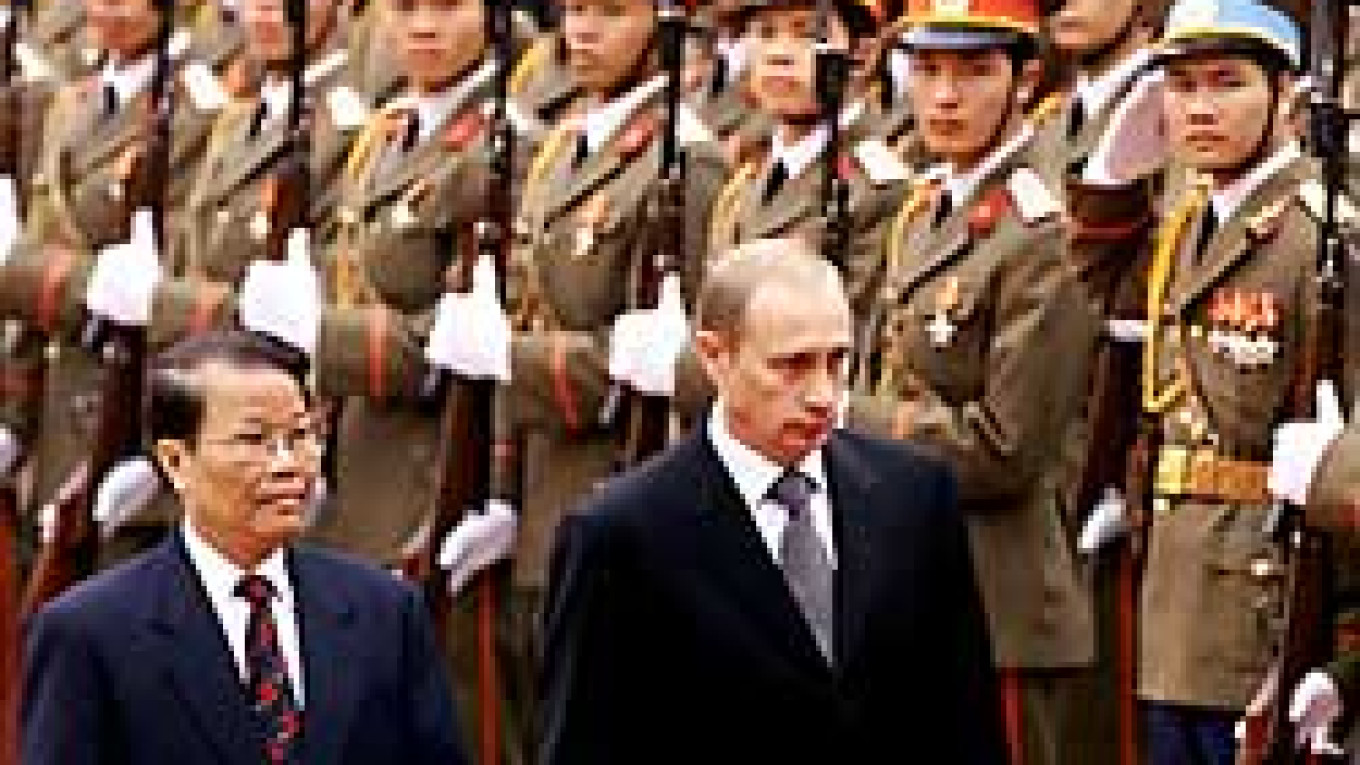In the declaration, Vietnam supported Putin's stance on U.S. missile defense while the Russian president later told a news conference Vietnam wanted to buy new Russian armaments.
The two countries also agreed their energy joint venture, Vietsovpetro, would explore a 100 square kilometer block off Vietnam's southern coast and Russia confirmed a $100 million loan to finance a Vietnamese hydropower project.
Deputy Prime Minister Viktor Khristenko told reporters the issue of Vietnam's remaining Soviet-era debt to Moscow was "completely solved." He estimated the debt first at $1.7 billion and then later at $1.5 billion and said that under a restructuring deal Vietnam had to pay $100 million a year.
He said the two countries were discussing using the payments for three purposes: reinvestment in Vietnam, training Vietnamese specialists or to supply goods such as coffee and rice to Russia and other countries.
Putin arrived in Vietnam on Wednesday from South Korea. He is trying to boost Russian influence in the region, which weakened dramatically after the collapse of the Soviet Union.
He will leave Friday after talks with Vietnam's Communist Party chief, Le Kha Phieu.
Despite Moscow's extensive military and economic support for Vietnam during the Cold War, Putin is the first Kremlin chief to visit the country, one of the world's few remaining communist states and once a key extension of Soviet power in Asia.
After signing the partnership agreement with counterpart Tran Duc Luong, Putin was asked at a joint news conference about the prospect of further military cooperation.
"Vietnam needs not just to maintain its existing weapons bought from the Soviet Union and Russia but also needs modern weapons. Vietnam wants and can afford to buy new weapons," he said. He did not say what type of weapons Vietnam wants.
A senior U.S. official in Hanoi said the United States was not worried by the prospect of new arms sales to Vietnam.
"Vietnam clearly requires a modification of its military and if they go to the Russians, to the degree that they can afford it, I don't think any of us have any major concerns."
Serious talks were expected during Putin's visit on the strategic naval base at Cam Ranh Bay, for which Moscow's lease expires in 2004, but the deputy head of the Kremlin administration, Sergei Prikhodko, played down the issue.
"We have an agreement signed in '79 and we have a lease on the base to 2004," he told reporters. "This agreement reflects our rights to use the base without any payments.
"We did not discuss the issue during this visit as there was no basis for such discussions," he said.
Analysts had not expected any final deal on Cam Ranh Bay during Putin's visit, but had said the issue would set the tone for future ties as well as Russia's strategic aims in Asia.
Analysts say the base in south-central Vietnam, used by Japan in World War II and then by the Americans in the Vietnam War, is vital to Russian strategic interests in the region.
Vietnam does not object to Russia's presence but wants it to boost lease payments. Analysts say Washington and Beijing eye the facility enviously for its strategic and commercial potential.
However, the U.S. official said Washington was not seeking any lease on Cam Ranh Bay and did not consider an extension of Russia's lease a threat.
"The U.S. really is agnostic on Cam Ranh Bay," he said. "We are not interested in acquiring any kind of lease on that facility."
Deputy Foreign Minster Alexander Losyukov said last week that Moscow expected "long and difficult talks on the problem."
Vietnamese Prime Minister Phan Van Khai, whom Putin also met Thursday, told Khristenko that Vietnam was ready to give priority to Russia in cooperation and investment to boost trade, which at about $400 million a year was far below potential.
Luong said the Vietnamese people "warmly welcomed" Putin, and Hanoi considered his visit a new stage in relations.
However, despite praise for Moscow in the state press, especially for its backing in the war against U.S.-backed South Vietnam and in building socialism, popular reaction to Putin has been muted.
A Message from The Moscow Times:
Dear readers,
We are facing unprecedented challenges. Russia's Prosecutor General's Office has designated The Moscow Times as an "undesirable" organization, criminalizing our work and putting our staff at risk of prosecution. This follows our earlier unjust labeling as a "foreign agent."
These actions are direct attempts to silence independent journalism in Russia. The authorities claim our work "discredits the decisions of the Russian leadership." We see things differently: we strive to provide accurate, unbiased reporting on Russia.
We, the journalists of The Moscow Times, refuse to be silenced. But to continue our work, we need your help.
Your support, no matter how small, makes a world of difference. If you can, please support us monthly starting from just $2. It's quick to set up, and every contribution makes a significant impact.
By supporting The Moscow Times, you're defending open, independent journalism in the face of repression. Thank you for standing with us.
Remind me later.


